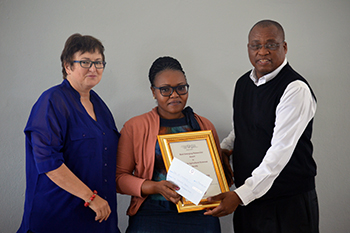Latest News Archive
Please select Category, Year, and then Month to display items
02 January 2025
|
Story Gerda-Marie van Rooyen
|
Photo Supplied
 Leading the research in South Africa is Prof Linus Franke from the Department of Soil, Crop and Climate Sciences.
Leading the research in South Africa is Prof Linus Franke from the Department of Soil, Crop and Climate Sciences.
Scientists are actively pursuing the successful breeding of diploid hybrid potatoes from inbred lines. This is expected to revolutionise potato breeding as it holds the key to rapid genetic progress. It will introduce new varieties for commercialisation through seed. Currently, existing potato variants have a gene that renders self-pollinated seeds infertile.
Prof Linus Franke, an academic in the Department of Soil, Crop and Climate Sciences at the UFS, is leading the research in South Africa. “This technology allows the production of genetically uniform potato seed that is easy to transport and largely disease-free.” He says this differs from conventional breeding whereby only vegetative propagation is possible due to tetraploid varieties in potatoes. It also risks carrying pests and diseases from one generation to the next – leading to the accumulation of pests and diseases with each round of multiplication.
Seed innovation
Prof Franke explains that Solynta BV, a seed company based in the Netherlands that produces potato varieties that can be grown from seed, has included South Africa in their research efforts because it is one of Africa’s largest producers and exporters. Through his academic relationship with Wageningen University and Research, a Dutch institution renowned for its agricultural endeavours and food production, the UFS became involved in researching hybrid potatoes grown from seed.
Diploid seeds containing two sets of chromosomes allow easier gene manipulation to increase predictability and speedier genetic progress. The breeding approach enables the incorporation of tolerance to pests, diseases, abiotic stresses (cold, heat, drought) and other desired genetic traits.
Although Prof Franke is optimistic about this research, he is not blind to disadvantages. “Potato seeds are tiny and have little energy reserves, making it harder to grow potatoes from seed than from tubers.” He says potatoes from seed will take longer to cultivate than tubers, as farmers need to grow plantlets from seeds first, adding six weeks to the growing period. “It is possible that commercial farmers can grow potatoes directly from seed. Alternatively, perhaps more likely, specialised growers will produce tubers of potatoes from seed; these tubers are then sold as seed tubers to other potato farmers, who then continue their normal practices of producing potatoes for the market from tubers.”
Financial benefits
Prof Franke says farmers have reason to get excited. “Seed potatoes will reduce input costs, as varieties with enhanced tolerance to pests and diseases require less pesticides. Planting one hectare of potatoes requires three to four tonnes of potato tubers, but only one 25 g packet of potato seeds.” Since potatoes are a more valuable commodity than maize, this technology might also increase farmers’ income potential.
UFS Qwaqwa Campus honours research champions
2016-11-22

Best Emerging Researcher in the Faculty of
Natural and Agricultural Sciences, Dr Puseletso Mofokeng,
being congratulated by Drs Elsa Crause
(Campus Vice-Principal: Academic and Research)
and Dipane Hlalele
(Acting Campus Vice-Principal: Operations).
The Centre for Teaching and Learning (CTL) and the Academic and Research Office on the Qwaqwa Campus of the University of the Free State recently honoured innovative academics and leading researchers. The event was the highlight of the 2016 academic year and was aimed at recognising academic innovation, dedication, and hard work.
The winning academics and categories were:
CTL Awards:
Dr Emile Bredenhand – Design Your Course
Dr Marga Stander and Bianca Naude (joint winners) – Student Engagement
Dr Marga Stander – Research in Teaching and Learning (runner-up: Fani Radebe)
Wouter de Wet – Assessment Methods (runner-up: Ntebohiseng Sekhele)
Ben Mase – Technology (runner-up: Dr Jared McDonald)
The History Department – Departmental Award
Outstanding researchers were also honoured per faculty on the day.
Academic and Research Awards:
The winners were:
Habasisa Molise – Best Emerging Researcher (Faculty of Education)
Calvin Mudzingiri – Best Emerging Researcher (Faculty of Economic and Management Sciences)
Dr Oliver Nyambi – Best Emerging Researcher (Faculty of the Humanities)
Dr Puseletso Mofokeng – Best Emerging Researcher (Faculty of Natural and Agricultural Sciences)
Dr Dipane Hlalele – Prolific Researcher (Faculty of Education)
Dr Jared McDonald – Prolific Researcher (Faculty of the Humanities)
Dr Tom Ashafa – Prolific Researcher (Faculty of Natural and Agricultural Sciences)
Prof Birhanu Dejene – Consistent Researcher
Prof Rodney Moffett – Life-long Researcher
The event also acknowledged Drs Geofrey Mukwada (Geography) and Aliza Le Roux (Zoology and Entomology) as newly-appointed Professors. The duo leads the Afromontane Research Unit.